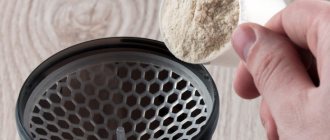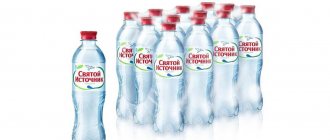You can often hear statements like this: “You should definitely start your morning with water”, “You can’t drink before, during or after meals”, “2 liters daily, there’s no other way”, “Tea and coffee don’t count”, “Dehydration leads to premature aging ", etc. There are so many myths around that many people can’t figure it out. Let's figure out together how much water you really need to drink.
Why is it important to drink water
Water is an essential nutrient that plays an important role in the human body. Without water, not a single biochemical and physiological process in the body is possible. This means that existence itself is impossible.
About 55–60% of an adult's body weight is water. In women, the proportion of water is usually slightly less than in men. This is due to the large amount of fat in the body. And fat, as you know, contains less water than muscle.
A newborn baby's water content is 77% of its body weight. With age, by 70–80 years it decreases to 50%.
If you still drink water from plastic bottles
It is better not to buy water in plastic bottles, as this is not only harmful to the environment (which at the moment already contains an appalling abundance of non-recyclable plastic that breaks down into small particles), but can also negatively affect your health.
Even though plastic manufacturers say it is safe, independent studies show that chemicals can leach from the bottle into the water and accumulate in the body, affecting the endocrine system. ()
If you still cannot switch to water in glass bottles or do not plan to buy a water filter, then try to do the following:
- Buy a reusable stainless steel bottle, refill it regularly and take it with you everywhere.
- Research several water suppliers/manufacturers and choose a company with a transparent history and publicly available water quality tests/inspections (ideally, these should be independent audits);
- When choosing water, give preference to spring water rather than purified or drinking water (bottled drinking water may not be any better in composition than tap water);
- Do not expose plastic bottles or 20-liter water bottles to heat, store them in the car in summer, or leave them in the sun.
Conclusion: before you wonder how much water you should drink per day, it’s worth finding out how you can provide yourself with truly high-quality water?
If you want to drink clean and safe water with a composition that is well known to you, filters seem to be the best solution.
However, there are many subtleties here: you need to know exactly the composition of the water that comes from the tap, and make sure that the type of filter you choose will purify the water well in your area/city/region.
It is advisable to find an independent organization that tests the water and can accurately advise you on its composition.
Functions of water in the human body
- It is a universal solvent and delivers nutrients to cells and tissues.
- Participates in metabolic reactions.
- Maintains hydration (moisture) of cells.
- Provides moisture to the mucous membranes of the respiratory tract.
- Maintains osmotic pressure of blood and tissues.
- Removes metabolic products and toxins.
- Regulates body temperature.
Despite its enormous role in maintaining life and health, our body cannot store water. Therefore, our cells must receive it every day from the outside.
How does water help you lose weight?
When there is a lack of moisture in the body, blood flow is disrupted, lymph thickens, and nutrients cannot move freely throughout the body to their destination - cells and organs. Because of this, the legs become numb, swelling and cellulite appear. A direct way to get rid of these symptoms of dehydration is to drink enough water every day.
Drinking 1.5-2 liters does not lead to exceeding the BJU norm, since water does not contain calories. Moreover, the liquid is involved in lipolysis - the breakdown of fat cells. Thus, everyone who is losing weight is prescribed to drink more water. How many? See more...
How much water should you drink?
Probably everyone has heard about the need to drink 2 liters or 8 glasses of liquid daily.
In fact, you can calculate how much you need to drink per day using the formula: 20–30 ml per 1 kg of weight
We think...
See table
| Body weight (kg) | Recommended amount of liquid (l) |
| 45 | 1,35 |
| 50 | 1,5 |
| 55 | 1,65 |
| 60 | 1,8 |
| 65 | 1,95 |
| 70 | 2,1 |
| 75 | 2,25 |
| 80 | 2,4 |
| 85 | 2,55 |
| 90 | 2,7 |
| 95 | 2,85 |
How much fluid do we lose per day?
Each of us loses approximately:
- 500 ml with urine;
- 500 - with sweat;
- 400 - with breathing;
- 200 - with feces.
At a minimum, these losses must be restored.
So, that turns out to be 1600 milliliters.
Many people think that this is the amount they should drink. Is it so? Not this way!
How does water enter the human body?
When we eat, we get approximately 700–800 milliliters of water from food. Liquid soups and borscht are not taken into account here, but only more or less solid food. Remember, all vegetables and fruits are more than 90% water.
In addition, carbohydrates, as a result of certain biochemical processes, form water - approximately 300 milliliters. Let us remind you that this includes all cereals, potatoes, pasta, bread, pastries, etc.
An adult under normal conditions needs at least 1600 ml of fluid daily. In a typical normal diet, approximately 800 ml is consumed with food. The body produces another 300 ml itself. All that remains is to drink 500 ml of liquid during the day, including soups, tea, coffee.
So, with a NORMAL diet, you need to drink at least 500 milliliters of fluid. Next you must follow the feeling of thirst! The body itself will tell you that it needs water.
Thirst is an excellent indicator; if you are thirsty, drink! If not, don’t force yourself!
But don’t be afraid of excess liquid. In reasonable quantities, the excess will quickly be eliminated and balance will be restored.
Doctors identify signs that indicate that you are drinking enough fluid :
- You don't feel thirsty.
- Your urine is light yellow.
If this is your case, then you are fine, there is nothing to worry about.
Do other liquids count towards the total water volume?
Plain water is not the only thing that affects fluid balance; other drinks and foods are also important.
Some people believe that drinks containing caffeine (such as coffee or tea) should not count toward your daily water intake because caffeine is a diuretic. However, research shows that this is not the case because the diuretic effect of these drinks is very weak. Most foods also contain water. Meat, fish, eggs and water-rich fruits and vegetables contain significant amounts of water. If you drink coffee or tea and eat water-rich foods, that's probably enough to keep you hydrated (unless you sweat a lot, of course).
Bottom line: Other drinks also help maintain fluid balance, including caffeinated drinks such as coffee and tea. Most foods also contain water.
When to drink more
As we have already found out, the amount of water depends primarily on weight. And also on age, gender, physical activity, environmental temperature conditions.
- The need increases during sports and heavy physical labor. Due to sweating, losses increase. Therefore, it is usually recommended to drink before, during, and after training.
- During periods of high temperatures, for example in summer. The risk of dehydration increases. But thirst will tell you how much to drink. The main thing is to listen to your body.
- Pregnant women, especially nursing women, also need increased amounts of fluid.
- With elevated body temperature, infectious diseases. Probably everyone remembers doctors’ advice about drinking plenty of fluids.
Benefits of water
All physiological processes occurring in the body occur in aqueous solutions or with the participation of water.
Water plays a mechanical role, being part of fluids that facilitate the sliding of joints.
- With the help of water, various waste products (sweat, urine) are removed from the body.
- Water, which is part of sweat, serves as a means of combating body overheating in hot rooms, since sweat, evaporating from the surface of the body, takes away a significant amount of heat.
Water intoxication and dehydration
A person reacts sharply to a lack of water.
Loss of 6–8% water leads to metabolic disorders.
10% - to irreversible pathological changes.
21% - to death.
Dehydration is a dangerous condition. It is usually associated with loss of fluid and electrolytes due to vomiting, diarrhea, and high fever. The patient feels thirst, weakness, headache, dry mucous membranes, blood pressure decreases, and the amount of urine decreases. Fluid and salt replacement is recommended.
The opposite condition is water intoxication . Occurs due to excess fluid intake. For example, if you drink several liters in 2 hours. The kidneys will not be able to cope with such a volume; the water will flow into the cells, which will swell greatly. This will lead to disruption of their functions. Overhydration can lead to cerebral edema.
Therefore, it is better to drink regularly and little by little. Do not overload your kidneys by consuming your entire daily intake at once.
Symptoms that you are not drinking enough water
And although there is a universal answer to the question “How much water should you drink per day?” doesn't exist, there are markers and test questions that will help determine if you are not drinking enough water during the day:
- Do you often experience constipation?
- Do you have problems with your joints?
- Do you often feel thirsty but ignore it?
- Do you find it difficult to concentrate?
- Do you constantly feel tired?
- Do you often feel hot or feel like you're overheating?
- Are your lips, skin, or mouth dry?
- Do you often get sick?
- Do you have dry and brittle hair?
Also think about whether you are familiar with the following symptoms:
- Dry mouth;
- Tension in the neck or jaw;
- Drowsiness;
- Rare urination;
- Dark yellow color and pungent odor of urine;
- Muscle weakness, pain, spasms and cramps;
- Fatigue;
- Sense of anxiety;
- Irritability;
- Stress;
- Headache;
- Dizziness;
- Digestive problems (heartburn, colitis, constipation).
Please note: dehydration is a much more serious problem than just “I forgot to drink water and now I’m thirsty.” This means that you have already lost the optimal amount of fluid that allows your body to function properly.
Even when you lose 1% of fluids, your body temperature rises and it becomes more difficult for you to concentrate.
The thirst mechanism, as a rule, turns on at the moment when you have already lost 1-2% of water. It is also worth considering here that the mind tends to ignore the sensation of thirst for a certain time if we are busy with business.
The loss of 10% of fluid in the body threatens serious problems with the muscular, cardiovascular, immune and musculoskeletal systems.
Please note that if you constantly experience extreme thirst that you cannot quench, this may be a sign of diabetes or a tendency to develop it. ()
As a result, you will constantly feel thirsty as your body tries to replenish the fluid it is constantly losing. If, along with thirst and frequent urination, you have blurred vision, cuts and bruises that do not heal well, or a constant feeling of fatigue and hunger, please consult a doctor to get tested and check your health.
Is water good for weight loss?
Of course, only a calorie deficit leads to weight loss. But water also plays a role here:
- Reduces appetite. Drinking one or two glasses of water before meals reduces your appetite, so you can eat less.
- Replacing various sugary drinks with clean water reduces the daily calorie intake, which means it promotes weight loss.
- Sometimes people confuse hunger with thirst. Instead of drinking, they start eating. Drinking when you feel hungry also reduces the amount of food you eat per day.
- Speeds up metabolism. A study in 2003 proved that drinking 500 ml of water increased the metabolic rate by 30%. That is, by drinking 2 liters daily, you can increase energy expenditure by approximately 400 kJ (95 kcal).
Of course, water is not a magic diet pill. Such advice will not allow you to lose tens of kilograms. But losing a few kilograms is quite possible.
Where did the call for 2-3 liters of water come from?
- For the first time, such recommendations for quantity began to appear with the advent of the theory of vegetarian and even raw food nutrition, from people adhering to alternative nutrition methods. But the key word there is WATER, that is, a call for the predominance of water in the diet, replacing tea, coffee, and compotes with it.
- It is believed that drinking water manufacturers came up with this rule in an effort to increase sales.
- Another version: nutritionists dealing with the problem of weight loss - losing weight - began to focus on increasing water consumption.
But most likely all three factors coincided here and the myth about the volume of 2-3 liters of water began to impose itself on everyone.
Let's try to figure out whether the immense consumption of simple, even absolutely pure water is so beneficial and important for everyone. I foresee objections and even anger from H2O supporters!











